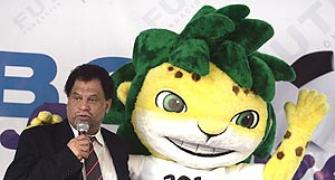 Even though English is South Africa's official first language, many World Cup visitors may find it hard navigating the local lingo, a bewildering mixture of Afrikaans, Zulu and nine other native tongues.
Even though English is South Africa's official first language, many World Cup visitors may find it hard navigating the local lingo, a bewildering mixture of Afrikaans, Zulu and nine other native tongues.
The following A-Z offers a rough guide for soccer fans worried about getting lost in South Africa's linguistic jungle.
A - Ayoba. A made-up word meaning "cool," and given continent-wide currency after its appropriation as a World Cup slogan by MTN, Africa's biggest mobile phone company.
B - Braai. Cooking meat on a fire is one of the few things that appeals equally to all South Africans, no matter their colour. Expect to go hungry if you refer to it as a barbecue.
C - China. No, not the country, which failed to qualify for the World Cup despite having 1.3 billion people to choose from. China, as in "Howzit, my old China?," means "friend," much as it does in London's East End, its probable port of origin.
"Chommie" takes "China" to the next level.
D - Dagga. Marijuana. Even though weed grows like a, er, weed in many parts of temperate South Africa, it is still illegal.
That said, expect more than the odd whiff at soccer fan parks, where you will also meet the "diski dance," a series of township soccer-inspired moves, and the "dumpie," a squat bottle of beer.
E - Eish! A catch-all expression of surprise or mild annoyance. Not allowed to appear in print without an exclamation mark.
F - Fundi. Every language has to have a word for the armchair soccer know-it-all. In South Africa, the Zulu word for "teacher" fills the void.
G - Gatvol. "Fed up" in Afrikaans. With the 'v' pronounced like an 'f', it's very similar to the English "gutful." As in "Eish! man. I'm gatvol of this fundi. He has no idea what he's talking about."
H - Howzit. Guttural shortening of "How is it going?" and the standard South African greeting. Spoken by true exponents with minimal movement of the lips.
Response should simply be another "Howzit" -- unless you are an excessively polite and verbose Englishman, in which case you can stick to "I'm fine, thanks. How are you?."
"Hola" and "Heita" are popular alternatives, especially if you want to be ayoba on the streets of Soweto.
I - Izzit. Another product of the same linguistic mangle as "Howzit," the abbreviation of "Is it?" signifies vague disbelief or surprise as in: "My girlfriend is something of a soccer fundi." Reply: "Izzit?"
J - Jol. Afrikaans for "party," a surprisingly widespread term given the former Dutch settlers' puritan reputation.
K - "Ke Nako." Sesotho for "It's time," and the expression that helped convince FIFA bosses in 2004 to award Africa its first World Cup.
L - Lekker. Pronounced "lacquer" but has nothing to do with furniture polish and everything to do with "good." Likely to be heard in conjunction with another L, "Laduma" -- Zulu for "He scores" -- if the prayers of 50 million South Africans are answered.
M - Moegoe. Idiot. Nothing more to say.
N - Now. A hard one to grasp for English-speakers used to their "nows" in the present or recent past.
"Now" is not "now" but some vague point in the near future. "Just now" is slightly sooner, and "Now now" sooner still, but not soon enough to be "Right now" -- an immediacy that appears to have fallen victim to the vagiaries of "Africa time."
O - Oke. Man. A shortening of "bloke" that can be shortened further to a simple "O." The latter is a rare example of a South African word unlikely to be shortened any further.
P - Pap. Maize meal. Does for South Africa what the potato does for Ireland.
Q - Quagga. A type of zebra identified by its stripey front end and monochrome, horse-like behind. It's extinct so you're unlikely to see one unless you've been smoking, in which case it's probably a dagga quagga.
R - Robot. South Africans have robots, not traffic lights, but don't expect to see Star Wars droids overseeing major intersections. They're just traffic lights.
S - Soutpiel. Derogatory but typically colourful Afrikaans term for Englishman. It literally means "salt penis" and comes from the view that early English colonists had one foot in Africa and one back home -- hence the proximity of their genitals to sea water.
T - Tsotsi. Gangster. Not someone you want to run into but unfortunately an all-too-present feature of one of the world's most crime-ridden countries.
U - Ubuntu. Community spirit. Often invoked as the answer to the myriad social problems left by decades of white-minority rule. Even though apartheid ended 16 years ago, the gap between haves and have-nots in South Africa is among the world's widest.
V - Voetsek. Slightly stronger than "Get lost" but not an out-and-out obscenity. Still, best not to use it if you meet a tsotsi.
W - Wors. Another shortening, this time for boerewors, the curly, mildly spiced sausage that forms the centrepiece of any braai.
X - Xhosa-nostra. A shadowy, secret organisation inside the ruling African National Congress (ANC) bent on securing national domination for the Xhosa, Nelson Mandela's tribe. Its existence is attested mainly in political gags.
Y - Yebo - Don't say Yes, say Yebo.
Z - Zamalek. Strong beer popular in townships. Zamalek derives from a 1990s dance song commemorating a clash between Egyptian soccer side Zamalek and Soweto giants Kaiser Chiefs.
Legend has it Zamalek is hangover-proof. Given that it comes in a 750 ml bottle, that is unlikely.








